Jim Thorpe assumed many titles over the course of his life: Olympian, Gold Medalist, Multi-Sport Athlete, Coach, Hall of Famer, Greatest of All Time. You may have even seen his name in the news recently.
But who was Jim Thorpe, really?
Who was Jim Thorpe?
James Francis Thorpe was born May 28, 1887. He grew up in the Sac and Fox Nation in what is now Prague, Oklahoma. Though his birthdate became the subject of much speculation, Thorpe himself later confirmed this was indeed his date of birth.
He attended Carlisle Indian Industrial School in Carlisle, Pennsylvania, where he was twice named an All-American in football.
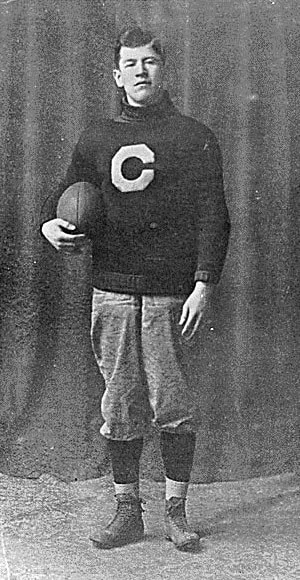
Thorpe went on to become a standout athlete and the first Native American to win an Olympic Gold Medal for the United States. He played football and baseball professionally and even barnstormed as a basketball player with a team made up entirely of Native Americans.
He is widely viewed as one of the greatest athletes of all time and a pioneer in the Native American community. Long before the likes of Deion Sanders and Bo Jackson became two-sport superstars, Jim Thorpe had already completed a stellar career as a multi-sport athlete.
Baseball Career
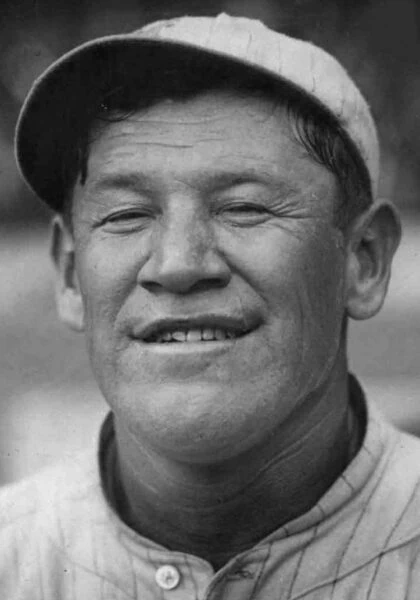
In 1913, Thorpe signed with the New York Giants. He played six total seasons as an outfielder in Major League Baseball between 1913 and 1919. He made his last MLB appearance Sept. 25, 1919, as a member of the Boston Braves. He finished with 82 RBIs, 176 hits, and a .252 career batting average.
Football Career

In 1915, Thorpe began his professional football career. At a chiseled 6'1, 202 lbs., Thorpe signed on as a running back with the Canton Bulldogs, leading them to three championships. In total, he played for six teams in the NFL.
In 1920, he became the first president of the American Professional Football Association (APFA). In 1922, the APFA was renamed as the NFL.
After his death, Thorpe was named to the inaugural 1963 class of the Pro Football Hall of Fame. For all of the success he had in various sports, there's a strong case to be made that Thorpe made his biggest impact as a football player.
Olympic Career
In 1912, Jim Thorpe became the first Native American to win a gold medal for the United States in the Olympics. He actually won two Olympic gold medals in the 1912 Summer Olympics in Stockholm, Sweden (one in the classic pentathlon and the other in the decathlon).
After his historic 1912 Olympic Games, which included a new world record for the decathlon, Jim Thorpe continued his dominance in track and field. He went on to secure a victory in the All-Around Championship of the Amateur Athletic Union.
Basketball Career
Thorpe was widely recognized as a standout in track and field, baseball and football, but he also dabbled in basketball. Yet, little is known about Thorpe's hoops career. In fact, it wasn't until 2005, that his biographers even learned he played basketball, thanks to a game ticket dated 1927 that was found in an old book.
Thorpe played for the “World Famous Indians,” a traveling basketball team, for at least a couple of years. But his stint with the organization was not well-documented because it wasn't a professional team, and because, by that point, Thorpe had reached the latter stages of his playing career.
Thorpe played professional sports until the age of 41. Right as he was wrapping up his sports career, the Great Depression was just beginning.
Jim Thorpe's Athletic Accomplishments
Thorpe received numerous accolades for his athletic accomplishments. Here are a few of the highlights:
Football career
- Pro Football Hall of Fame (part of the inaugural class of 1963)
- 3x NFL champion
- First-team All-Pro (1923)
- NFL 1920s All-Decade Team
- NFL 50th Anniversary All-Time Team
- 2× Consensus All-American (1911, 1912)
Other
- 2x Olympic Gold Medalist in the 1912 Olympics (classic pentathlon and decathlon)
- The new world record for the decathlon in the 1912 Olympics
- Amateur Athletic Union All-Around Championship in the decathlon
- Associated Press ranked him as the “greatest athlete” from the first 50 years of the 20th century
Jim Thorpe's Legacy

Olympic Controversy
In a decision that was, and still is, highly controversial, Jim Thorpe was stripped of his two Olympic Gold Medals after it was deemed he had been paid as a semi-professional baseball player before competing in the Olympics. This violated the “contemporary amateurism” rules in place, which prohibited all Olympic athletes from competing professionally or semi-professionally prior to Olympic competition.
However, 30 years after Thorpe's death, in 1983, his medals were restored by the International Olympic Committee (IOC). The IOC ruled that the decision to strip Thorpe of his medals fell outside of the maximum 30-day window.
Finally, in July 2022, more than a century after the event, the IOC announced they would restore Thorpe as the sole champion in both the decathlon and the pentathlon in the 1912 Olympic Games. Up until then, official records had Thorpe listed as only “co-champion” of both events. Why it took 108 years to give Jim Thorpe the recognition he always deserved is baffling, to say the least. But despite the controversy surrounding his medals, much of the general public still viewed Thorpe for what he always was: a pioneer and an Olympic champion.
Racial Heritage
Though Jim Thorpe was raised as a Native American in Indian Country, both of his parents were half Caucasian. Because of this, Thorpe's genetic heritage was the subject of much controversy. Some believed that Thorpe's athletic achievements were all the more impressive due to the significant racial inequality that permeated the United States at the time. Some even believed that if Thorpe were not indigenous, he never would've had his medals stripped.
In 1912, when Thorpe won his gold medals, not all Native Americans were recognized as U.S. citizens. It actually took another 12 years for United States Congress to pass the Indian Citizenship Act, which granted citizenship to all Native Americans born within the territorial limits of the country.
Film
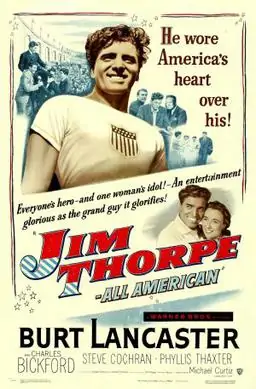
Given Thorpe's massive success as a sports superstar and Olympic champion, it was only a matter of time, before Hollywood took notice. In 1951, Jim Thorpe was portrayed by Burt Lancaster in the Warner Bros. film “Jim Thorpe – All American.” The film, directed by Michael Curtiz, featured archival footage of the 1912 Olympics. The real Jim Thorpe is shown in one scene as a coaching assistant. In the U.K. the film was distributed under the title “Man of Bronze.”
View the trailer for “Jim Thorpe – All American” below:
Jim Thorpe, Pennsylvania
It's not a coincidence. The town of Jim Thorpe, Pennsylvania was named in Jim Thorpe's honor. Though he wasn't born in Pennsylvania, Thorpe did begin his legendary sports career there.
The town of Jim Thorpe is about 80 miles north of Philadelphia and 100 miles west of New York City.
To this day, the town has a monument site containing two statues of Thorpe, his tomb, and historical markers describing his life story.
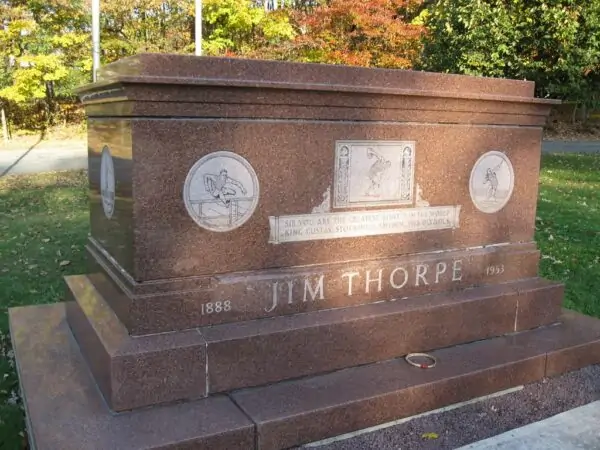
Jim Thorpe's Death
Jim Thorpe reportedly suffered from alcoholism and lived the final years of his life in poor health. He suffered from heart failure and died on March 28, 1953. He was survived by his third wife, Patricia, and his eight children.
Last Updated on January 18, 2023 by Paul G
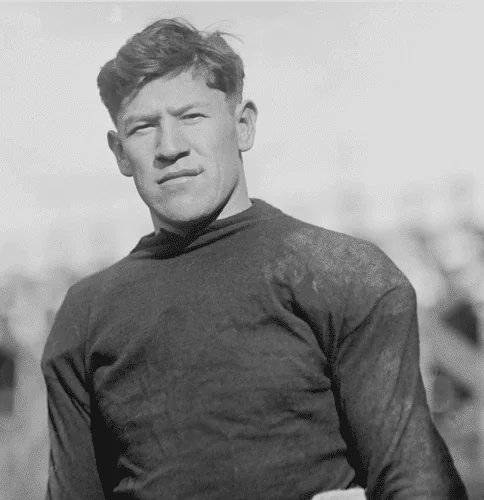
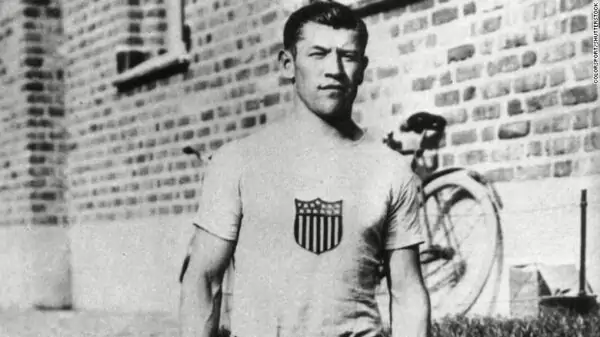
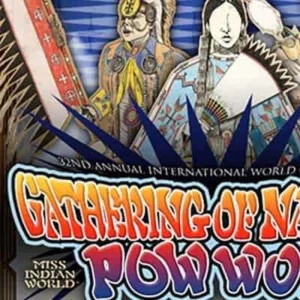
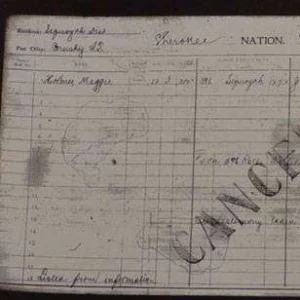
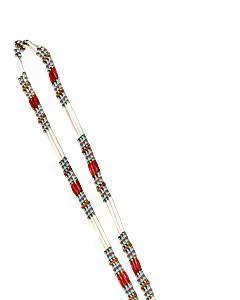
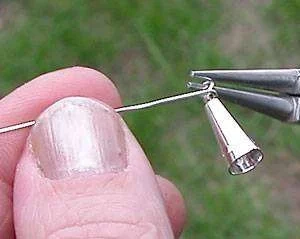
joyce wilson
says:Great article!